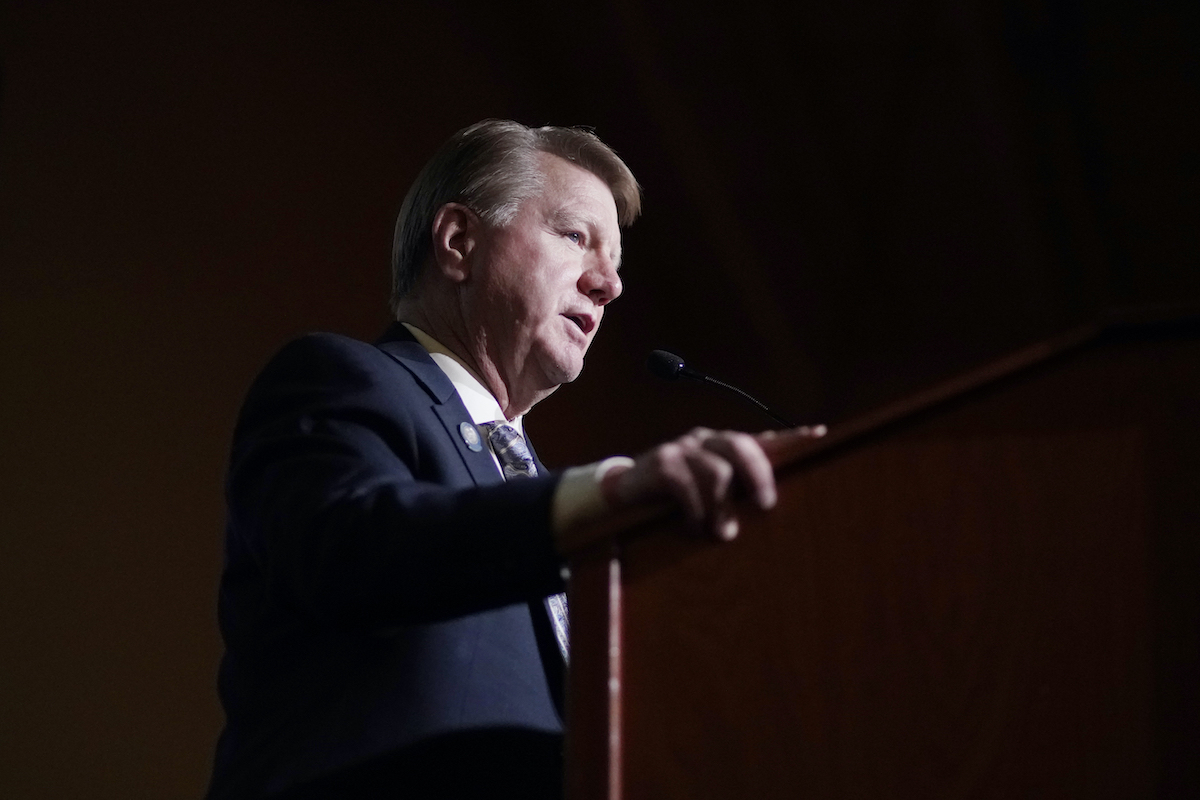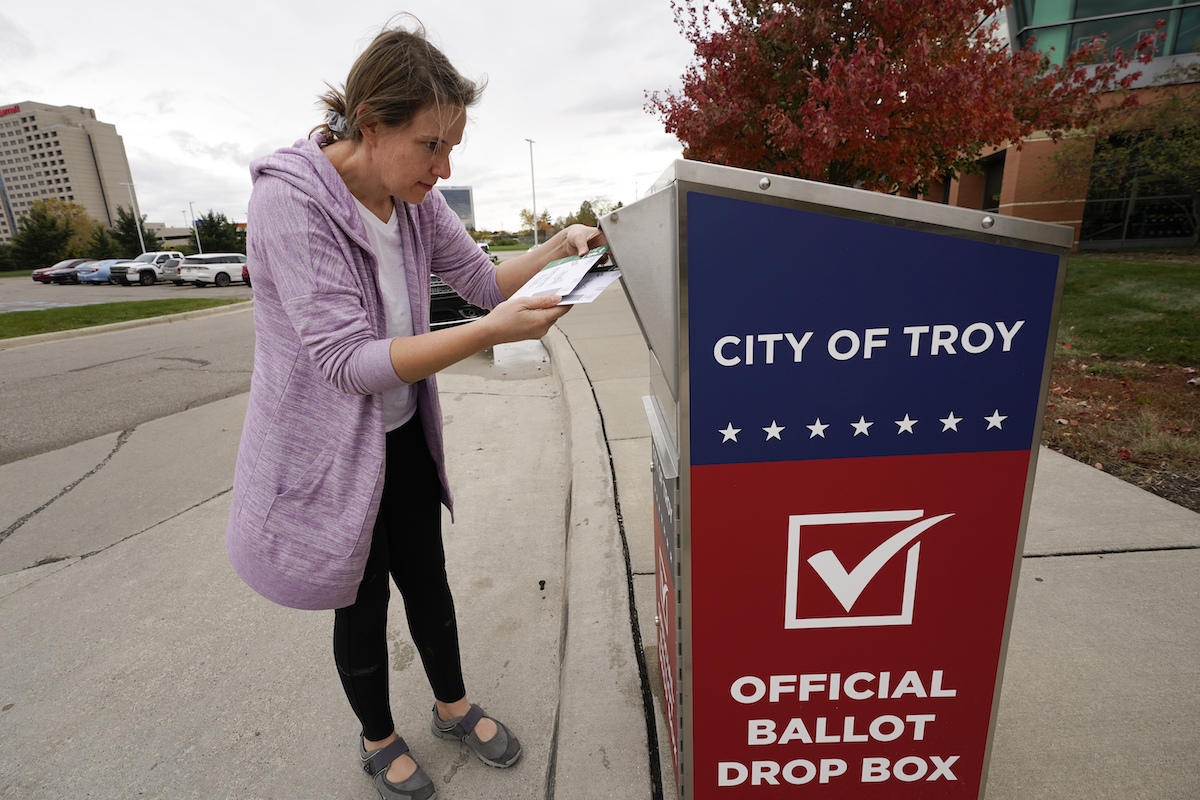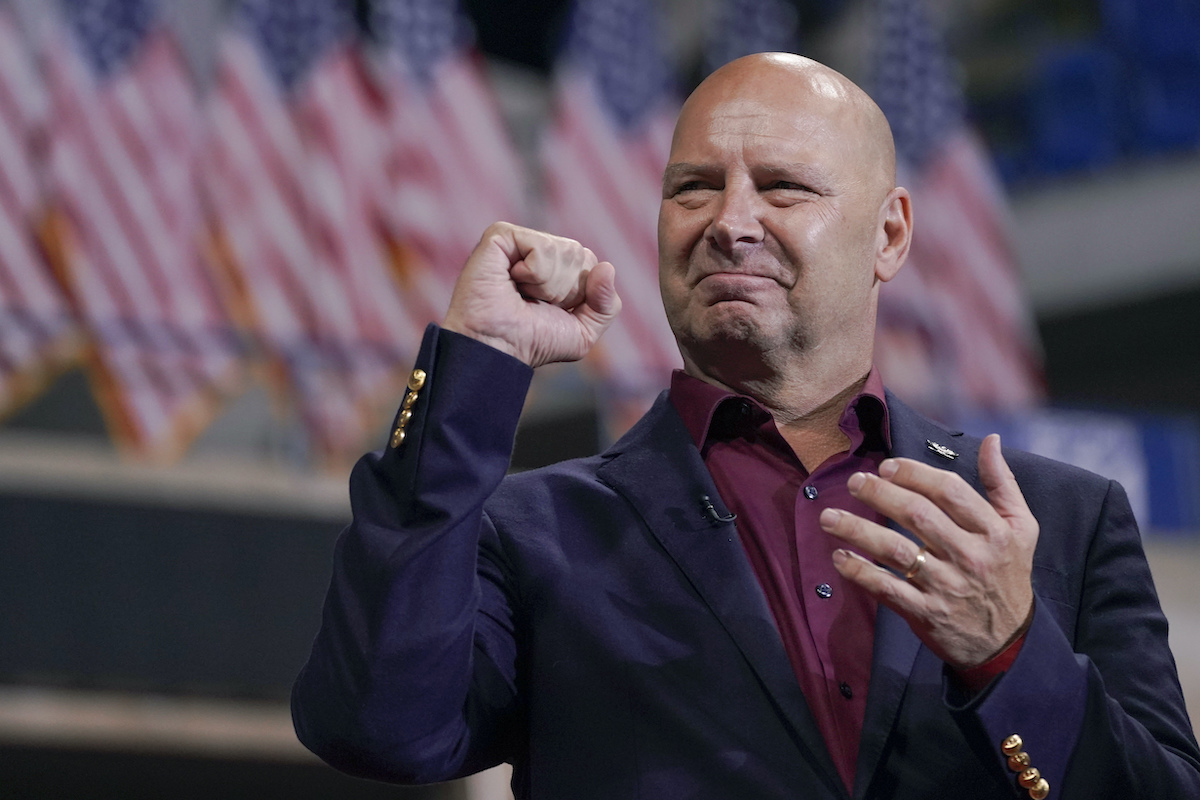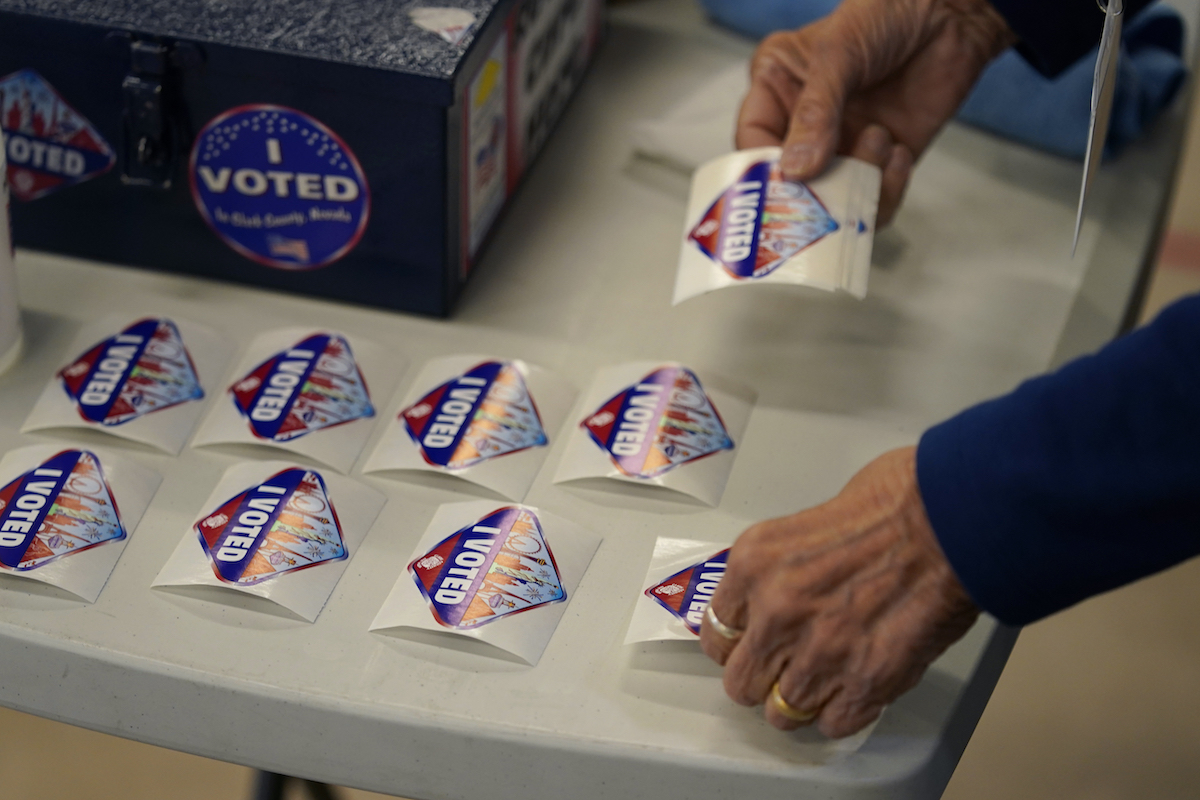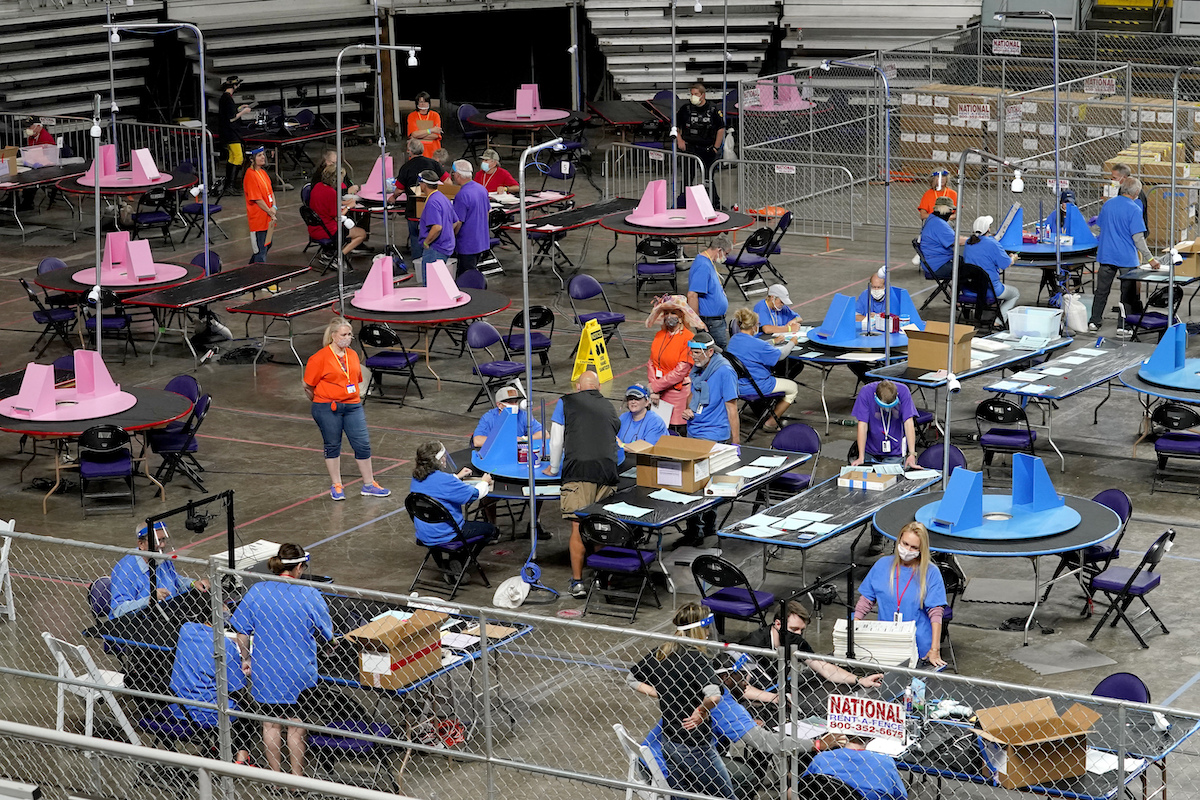Stand up for the facts!
Our only agenda is to publish the truth so you can be an informed participant in democracy.
We need your help.
I would like to contribute
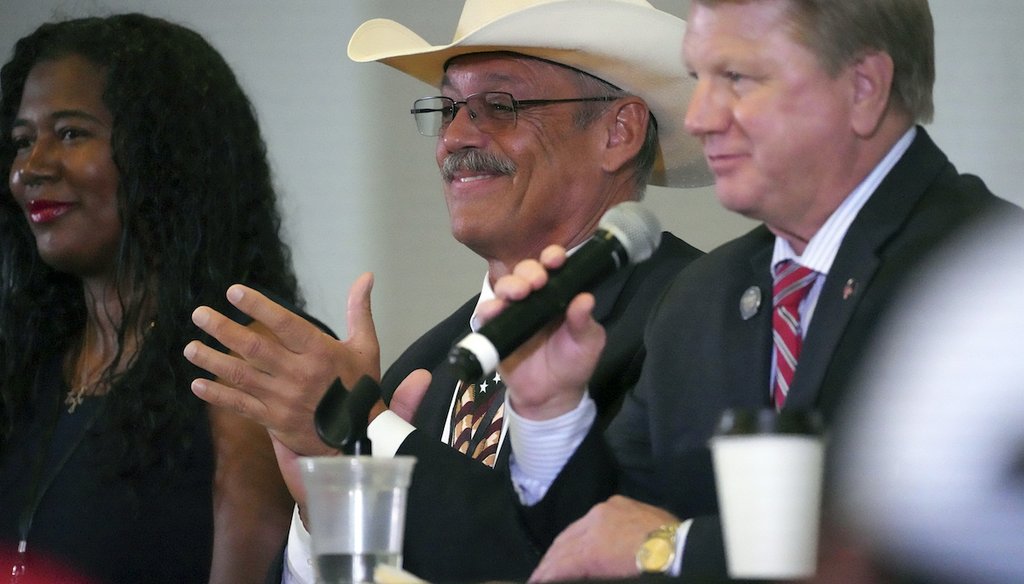
Kristina Karamo, candidate for Michigan Secretary of State, Mark Finchem, candidate for Arizona Secretary of State and Jim Marchant, candidate for Nevada Secretary of State, attend an event about election conspiracies in Florida Sept. 10, 2022 (AP)
If Your Time is short
-
Election deniers are running for statewide offices across the nation, including for secretary of state and governor. If they win in November, they will have some powers of oversight for future elections.
-
Their platforms include ending and restricting voting by mail, even in places such as Arizona where most voters cast their ballots that way. But voting rights are set in state laws which means that officials would need buy-in from state lawmakers to make several sweeping changes to longstanding voting practices.
-
Deniers are running under platforms rooted in the falsehood that the 2020 election was stolen from former President Donald Trump.
Midterm ballots in nearly every state include candidates who believe the 2020 election was fraudulent or "stolen."
That leaves American election systems at a pivotal moment: If people who deny Joe Biden won the presidency win their own elections Nov. 8, could they really execute their plans and dismantle the machinery that keeps American democracy running?
Elections expert Sylvia Albert of Common Cause predicted the scenario is inevitable: "We will see somebody who denies the 2020 election win office. We will."
The candidates’ ideas for reform are varied, but radical. Some want to end voting by mail or early voting. Pennsylvania’s Doug Mastriano floated the idea of requiring voters to re-register if he’s elected governor. Arizona gubernatorial candidate Kari Lake proclaimed her primary victory and posed with a sledgehammer she said was intended to be used on electronic voting machines (the same kinds of machines that were used to tabulate her victory).
Could hand-counted ballots and in-person-only voting really be the future?
Trey Grayson, a former Kentucky secretary of state, said election experts need to raise the alarm about how these proposed changes could alter U.S. elections. But individual officials are not all-powerful.
"Just because a denier is elected to an office, doesn't mean that the denier has free rein to create chaos or subvert the will" of the voters, said Grayson, a Republican.
Many voting rights, such as the right to a mail ballot, are established in state law and cannot be changed unilaterally by one governor or one secretary of state. That said, there are ways some of these candidates could use their offices to significantly impact some mainstays of American voting systems.
How might that look? We delved into these campaign ideas to see just how far people who deny the legitimacy of the 2020 election results could go if elected.
Jim Marchant speaks at a Republican election night watch party, on Nov. 3, 2020, in Las Vegas. (AP)
President Donald Trump showered the 2020 campaign trail with false claims about what he described as the fraudulent nature of voting by mail.
Fraud by mail ballot is statistically rare — and there is no evidence fraud contributed to Biden’s win — but the mail-in ballot still serves as a popular talking point for candidates seeking favor with the pro-Trump electorate.
A multistate coalition of candidates has been vocal in its opposition to widespread mail voting.
That position comes with inherent contradictions.
Take Nevada secretary of state candidate Jim Marchant, leader of the America First Secretary of State Coalition. He opposes most mail voting but accepted that he won the Republican primary in August through an election in which more than half of Nevada’s voters cast mail ballots.
Another member, Arizona secretary of state candidate Mark Finchem, was a state lawmaker who traveled to Washington, D.C., on Jan. 6, 2021, when Trump supporters stormed the Capitol to protest the congressional certification of the 2020 election. During a July campaign speech, Finchem said, "I don’t believe in mail in ballots at all. That’s where the fraud happens."
Many of these candidates indicate they oppose a system that allows anyone to get a ballot ahead of Election Day. But they said they are willing to make exceptions for the military, for example.
Finchem’s path to undo mail voting would be difficult — a 30-year-old state law allows any voter to cast a ballot by mail. And about 75% of Arizona voters right now are on a recurring list to get a mail ballot.
Similarly, in Michigan, the right to vote by mail has been constitutionally protected since 2018, when voters there approved a constitutional amendment providing all voters access to absentee ballots for any reason.
That means any wholesale changes to the law would require the support of state legislators — people who won their own offices under a system that allows mail balloting.
But there are some ways Finchem and other statewide officials could add barriers to voting by mail without legislation.
One: They could change some states’ election procedure manuals.
Arizona’s manual is drafted by the secretary of state for approval by the attorney general and governor. An official could write a manual with onerous requirements for verifying signatures on ballots, for example.
Any sweeping changes to rules or laws would likely face legal challenges. But election deniers in office will have the power of their voice.
"They have an official megaphone to amplify election conspiracy theories and continue to sow doubt about the election system and that makes a crisis much more likely," said Ben Berwick, counsel at Protect Democracy, a nonprofit founded in late 2016 that says its mission is to prevent the U.S. from "declining into a more authoritarian form of government."
On Oct. 15, 2020, Nikki Schueller inserts her absentee voter ballot into a drop box in Troy, Mich. (AP)
Ballot drop boxes are another point of contention for some of these candidates. Dinesh D’Souza falsely singled them out in his "2000 Mules" film as being a means of corruption. There’s no evidence of that; they’re often more secure than standalone mail boxes.
In Michigan, Republican gubernatorial candidate Tudor Dixon said that if she wins against Democrat incumbent Gov. Gretchen Whitmer, she would ban these receptacles from being used for ballot collection.
That would require legislation, said Christopher Thomas, a fellow with the Bipartisan Policy Center and former election director for secretaries of state of both parties in Michigan. "If she had a Republican Legislature, she might be able to pull that off," Thomas said.
That’s not out of the question.
Republicans have control of Michigan’s House and Senate. Newly drawn voting districts offer Democrats a better-than-before chance of wresting control from the GOP, but everything rests on Election Day.
Michiganders’ November ballots also include a measure to expand drop box access. Proposal 2 would require that the state provide at least one drop box for every 15,000 voters in a municipality. It would also establish at least nine days of early voting and require the state to pay postage for absentee applications and ballots.
Pennsylvania Republican gubernatorial candidate Doug Mastriano speaks ahead of former President Donald Trump at a rally in Wilkes-Barre, Pa., Sept. 3, 2022. (AP)
Some candidates said they would have refused to certify the 2020 election, Nevada’s Marchant and Arizona’s Finchem among them.
This raises concerns that, if elected, they would use their power to try to manipulate results in 2024.
Any efforts to refuse certification of results would face legal challenges, just as they did in 2020. In New Mexico, Otero County refused to certify the 2022 primary results as commissioners said they didn’t trust the machines. In June, the state’s Supreme Court ordered the county to certify results.
Pennsylvania’s Mastriano vowed to decertify election machines he believes were rigged. Mastriano is also aligned with the America First Secretary of State Coalition and was outside at the Capitol on Jan. 6, 2021. His campaign funded buses for people to travel to the rally that occurred before the attack.
If Mastriano won against Democrat Josh Shapiro, he would have the power to appoint the person who could decertify machines, which would mean that those machines could no longer be used. Unlike most states in which the secretary of state is elected to oversee elections, Pennsylvania’s chief elections officer is appointed by the governor through a position known as the secretary of the commonwealth.
As a state senator, Mastriano in 2020 sought to delay certifying the election results and pushed to give the General Assembly control of which electors to send to Washington, rather than follow the will of the voters. State Republican leaders rejected that idea. Such a move, along with his suggestion to "restart" voter registration, would face litigation.
Attorney Kevin Greenberg represents the Pennsylvania Democratic Party. He is unapologetically opposed to Mastriano’s proposals on grounds they would violate state and federal laws.
If Mastriano as governor "does even a fraction of what he said he is going to do on voter registration lists and voting machines, we will have chaos, attempted voter suppression and years of litigation," Greenberg said. "It will make the litigation of 2020 and even 2022 seem like child's play."
A poll worker lays out "I Voted" stickers at a polling place Tuesday, June 14, 2022, in Las Vegas. (AP)
The America First coalition calls for "aggressive voter roll clean up." Mastriano was more specific when he said that as governor he would have the authority to "restart" voter registration.
Wiping the voter rolls would violate the purpose of the National Voter Registration Act, Eliza Sweren-Becker, a lawyer for the Brennan Center for Justice at New York University, previously told PolitiFact. The law sought to increase voter registration, and maintaining voter rolls without requiring everyone to actively re-register prior to a specific election ensures greater access.
But Marchant has vowed that as secretary of state he would remove Nevada from a consortium known as the Electronic Registration Information Center. More than half of the states, including Republican-led Florida and Alabama, belong to the consortium partly because it provides an efficient means of sharing data about voters who have moved or died.
Alabama Secretary of State John Merrill, a Republican, said that his state uses the database to "preserve a clean and accurate voter list." Since 2016, the state has used it to remove tens of thousands of voters who died, moved or had duplicate registrations.
As secretary of state, Marchant would need only to provide written notice to withdraw. Marchant falsely claimed the consortium is linked to liberal billionaire George Soros.
Maricopa County ballots cast in the 2020 general election are examined and recounted by contractors working for Florida-based company, Cyber Ninjas, at Veterans Memorial Coliseum in Phoenix on May 6, 2021. (AP)
After Trump lost in 2020, voting machines became fodder for meritless conspiracy theories that machines "flipped" results or deleted Trump votes.
The Bipartisan Policy Center found that machines lead to faster, more accurate results. Electronic tabulators are used by about 90% of jurisdictions nationwide.
Lake and Finchem filed a lawsuit to get rid of Arizona’s longtime use of election machines, but a judge dismissed it, partly because of a lack of standing. In his ruling, the judge wrote that officials take steps to ensure security of election machines including "testing by independent, neutral experts."
The Arizona Legislature authorized the use of electronic voting systems in 1966; but state law does not require them. Arizona’s secretary of state has the power to decertify the machines, meaning they can eliminate them. So, if Finchem wins that seat, it’s possible he could decertify machines and refuse to certify new equipment.
But any effort to eliminate voting machines could face significant hurdles — not the least of which would be adapting to the alternative: hand counting.
Counting millions of ballots statewide by hand would pose a series of logistical challenges, and could drag on for months. That could run afoul of state laws that require official results by a certain date in order to meet certification deadlines.
When contractors hired by Arizona Republicans counted the presidential and Senate races on Maricopa County ballots, they started in April 2021 and it took until September for them to release their findings (which confirmed Biden won).
In Nye County, Nevada, longtime Republican election clerk Sam Merlino retired earlier than planned in protest over a change to count ballots both by hand and electronically. His replacement is a Marchant ally, Mark Kampf, who told PolitiFact he is working to recruit up to 40 volunteers to help with the hand count.
"We have so many checks and balances it seems like we are going backwards," said Merlino. "I've been doing it for 20 years, and I trust the system."
Sadmira Ramic, an attorney with the American Civil Liberties Union of Nevada, predicts problems.
"A hand count will not only possibly lead to inaccurate results, but people who are possibly election deniers are counting the votes which opens up the possibility of tampering," she said.
RELATED: How ‘stop the steal’ Republicans seeking office hope to restrict voting
RELATED: A coalition of ‘stop the steal’ Republicans aims to take control of US elections. QAnon is helping
RELATED: Nevada Republican misleads about DMV registering "illegals" to vote
Our Sources
AP, 2020 results denier to oversee voting in rural Nevada county, Aug. 3, 2022
Nevada Independent, Nye County’s new top election official wants to hand count ballots, distrusts voting machines, Aug. 3, 2022
FiveThirtyEight, Sixty percent of Americans will have an election denier on the ballot this fall, Sept. 13, 2022
Politico, When an election denier becomes an election chief, Aug. 29, 2022
Washington Post, What would happen if a state official refused to certify an election? Aug. 5, 2022
Washington Post, Why hand-counting ballots is such a bad idea, April 8, 2022
Democracy Docket, Moore v. Harper, Filed Nov. 18, 2021
JustSecurity, The independent state legislature theory should horrify Supreme Court’s originalists, June 30, 2022
Arizona Secretary of State, Election procedures manual, 2019
Sabato Crystal Ball, Secretary of state races: Election deniers carry GOP banner in several key states, Aug. 11, 2022
Pennsylvania Secretary of the Commonwealth Kathy Boockvar, Memo about decertification, April 23, 2020
AP, Pennsylvania decertifies county’s voting system after audit, July 21, 2021
Mark Finchem, Arizona secretary of state candidate, Speech to United Patriots Arizona, July 28, 2022
U.S. District Court Judge John Tuchi, Order in Lake v Hobbs, Aug. 26, 2022
ABC, Trump's candidates celebrate after Arizona primary, but some Republicans are worried, Aug. 3, 2022Nevada Secretary of State, Primary turnout, 2022
Arizona Mirror, Mark Finchem was much closer to the Jan. 6 insurrection than he claimed,June 2, 2021
PennLive, Frontrunning Pa. governor candidate still focused on unproven election fraud claims, March 20, 2022
PolitiFact, Joe Biden is right that more than 60 of Trump’s election lawsuits lacked merit, Jan. 8, 2021
PolitiFact, Ballot drop boxes were popular in 2020. Then they became a GOP target, May 19, 2021
PolitiFact, Trump’s cascade of falsehoods about voting by mail, Nov. 1, 2020
PolitiFact, The faulty premise of the ‘2,000 mules’ trailer about voting by mail in the 2020 election, May 4, 2022
PolitiFact, All of our fact-checks about elections, accessed Sept. 21, 2022
Interview with Christopher Thomas, a fellow with the Bipartisan Policy Center’s Democracy Project, Sept. 8, 2022
Interview with Jay Heck, executive director of Common Cause in Wisconsin, Sept. 7, 2022
Telephone Interview, Sylvia Albert, director of voting and elections at Common Cause, Sept. 12, 2022
Email interview, Trey Grayson, a former Kentucky Secretary of State and member of FrostBrownTodd law firm, Sept. 12, 2022
Interview, Stanley Brand, a PennState law professor who has practiced election law cases, Sept. 9, 2022
Telephone interview, Pinny Sheoran, head of the Arizona League of Women Voters, Sept. 12, 2022
Interview, Ben Berwick, co-leader of the elections and voting rights team at Protect Democracy, Sept. 13, 2022
Telephone interview, Sadmira Ramic, attorney ACLU of Nevada. Sept. 8, 2022
Telephone interview, Mark Kampf, Nye County clerk, Sept. 12, 2022
Email interview, Kevin Greenberg, GreenbergTraurig shareholder, Sept. 14, 2022
Interview with Amir Badat, voting special council for the NAACP Legal Defense and Educational Fund and manager of the Prepared to Vote and Voting Rights Defender projects, Sept. 13, 2022
PBS Wisconsin, Wisconsin Supreme Court rules state law does not permit ballot drop boxes, July 8, 2022
Arkansas Democrat Gazette, Wisconsin ruling blocks curing absentee ballots, Sept. 8, 2022
Dixon for Governor, Election integrity, accessed Sept. 13, 2022
Michels for Governor, Tim Michels blueprint to restore election integrity, accessed Sept. 13, 2022
Kristina Karamo for Secretary of State, The Karamo platform - on the issues, accessed Sept. 13, 2022
PBS Wisconsin, The race for Wisconsin secretary of state takes on higher stakes in 2022, Aug. 3, 2022
Milwaukee Journal Sentinel, Republican governor candidate Tim Michels calls for mass firings at state elections commission, repeal of election guidance to clerks, May 12, 2022
Brennan Center for Justice, Wisconsin: Election denial in races for election administration positions, Aug. 10, 2022
Brennan Center for Justice, Michigan: Election denial in races for election administration positions, Aug. 31, 2022
States United Democracy Center, Replacing the refs, July 29, 2022
NPR, The Wisconsin Supreme Court says ballot drop boxes aren't allowed in the state, July 8, 2022
Detroit Free Press, Voters approve Proposal 3, bringing sweeping changes to Michigan's election law, Nov. 6, 2018
Bridge Michigan, Voting rights ballot measure: What Proposal 2 would change in Michigan, Sept. 9, 2022
Wisconsin Elections Commission, About the WEC, accessed Sept. 13, 2022
Ballotpedia, Party control of Wisconsin state government, accessed Sept. 13, 2022
Ballotpedia, 2022 Michigan legislative session, accessed Sept. 13, 2022
The Guardian, The latest threat to democracy? A Trump-backed candidate willing to ‘find extra votes,’ April 1, 2022
Detroit Free Press, Michigan House passes bills that would increase penalties for absentee ballot fraud, May 26, 2021
Michigan Legislature, Michigan election law (excerpt) act 116 of 1954, 168.937, accessed Sept. 13, 2022
Michigan Legislature, Michigan election law (excerpt) act 116 of 1954, 168.932a Violations as felony; penalty, accessed Sept. 13, 2022
Michigan Radio, Voters pass measure to make voting easier, including no-reason absentee voting, Nov. 7, 2018
Reuters, Wisconsin Supreme Court outlaws ballot drop boxes for elections, July 8, 2022
NPR, Tudor Dixon will face Gov. Gretchen Whitmer in Michigan race for governor, Aug. 2, 2022
Bridge Michigan, Who is running for attorney general in Michigan in 2022, June 21, 2022
Reuters, Exclusive: Trump-backed Michigan attorney general candidate involved in voting-system breach, documents show, Aug. 8, 2022
The Detroit News, DePerno wins GOP attorney general race after runoff; Karamo wins SOS endorsement, April 23, 2022
Ballotpedia, Michigan Attorney General election, 2022 (August 27 Republican convention), accessed Aug. 23, 2022
Ballotpedia, Michigan Secretary of State election, 2022 (August 27 Republican convention), accessed Aug. 23, 2022
PBS, Oct. 15, 2021- Tudor Dixon | Off the Record, Oct. 15, 2021
Bridge Michigan, Tudor Dixon: What to know about the Republican taking on Michigan Gov. Whitmer, Aug. 2, 2022
Detroit Free Press, Michigan House passes bills that would increase penalties for absentee ballot fraud, May 26, 2021
The Washington Post, How Trump’s effort to overturn 2020 is sanitized for the general public, Aug. 1, 2022
Pittsburgh Post-Gazette, Pennsylvania will receive funding to upgrade voting machines, but will it be enough? April 16, 2018
Associated Press, Pennsylvania decertifies county’s voting system after audit, July 21, 2021
Pennsylvania Department of State, Directive concerning the purchase of electronic voting systems, Feb. 9, 2018
Emailed statement from Sara Broadwater, communications director for Tudor Dixon, Sept. 14, 2022
Emailed statement from Anna Kelly, spokesperson for Tim Michels, Sept. 14, 2022
Detroit Free Press, Early voting amendment could land on Michigan's November ballot, petition organizers say, July 11, 2022


